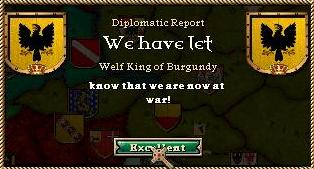Part 18: Crusader Kings: Chapter 18 - Lust and Madness: 1208 - 1216
1208 - 1216: Lust and Madness
The first thing Konstatinos does after the peace is signed is to revive the defunct Grand Duchy of Saxony.

Most of the conquered provinces are kept in the demesne, but Loon is made a Bishopric to silence Rome's pointed questions about the choice of direction for Konstatinos' crusade.

In October of 1208, Alexandria and its surrounding lands fall to the crusading armies of the English King and the crusade against Egypt is declared at an end.
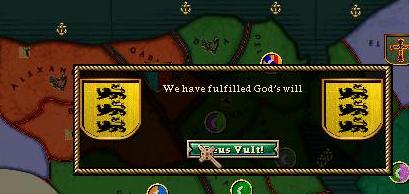
The Irish King of England, nicknamed "Columb d'Poulet", took no active part in the Crusade, preferring to sit at home and let his marshal battle the Egyptian hordes. This may please Rome, but his peers in the other catholic kingdoms are less than impressed.
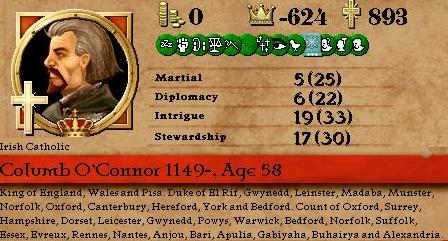
Konstatinos feels that the time has come to deal with the independent Duke of Brandenburg, a brilliant tactician who managed to defeat a German army thrice the size of his own to win his independence, a bitter lesson that the Hohenzollern ruler has taken to heart.
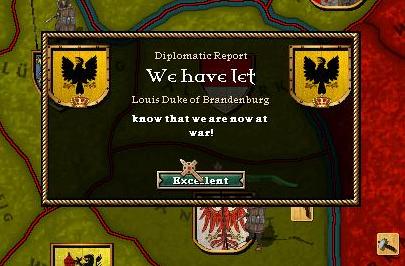
This time around, Konstatinos takes no chances.
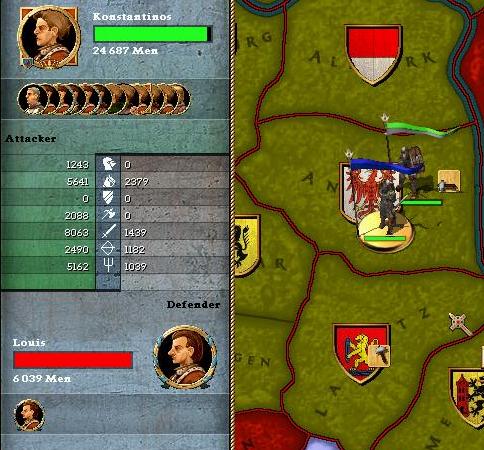
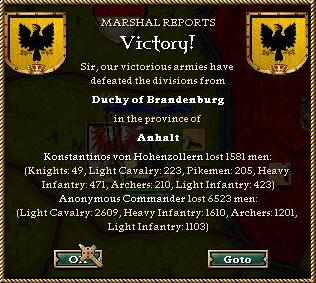
The Duke of Brandenburg and most of his army is killed in the battle. Konstatinos takes his titles, and awards them to his son Andronikos, who already rules Altmark. Brandeburg is now a Hohenzollern duchy.
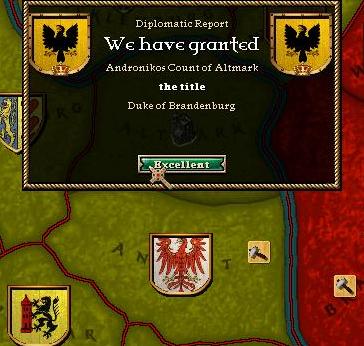
Bohemia is facing troubled times in 1209. Its ruler has been excommunicated for his bitter rivalry to the Pope, and is not only facing inner turmoil, but a declaration of war from treacherous Burgundy.
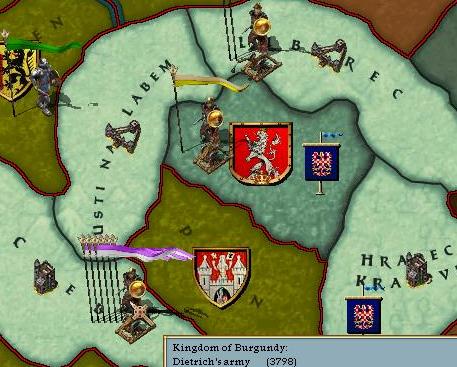
Sensing that the time to take revenge against Burgundy is finally at hand, Konstatinos begins to mass troops in Saxony, Swabia and Austria, intending to join the war on Bohemia's side. However, as he is inspecting his forces in Oberbayern, King Konstatinos suddenly clutches his chest and crumples off his horse. At the age of 46, the King of Germany and head of the Hohenzollern dynasty has had a heart attack, and is dead almost instantly.

The electors convene, and Otto of Austria is chosen as his successor, as expected. Otto is a weak-willed Hohenzollern pawn, but also a coward who has little interest in going through with Konstatinos' plans of war. The army is demobilized and Germany adopts a neutral stance in the Burgundian-Bohemian war.

Isaakios, Duke of Swabia-Baden-Bavaria, is now the head of the dynasty. Proud and selfish, he is an arrogant man who considers bloodline to of paramount importance, and who despises bastards, heretics and the lower classes equally.

A chronicler travels to Swabia to ask for patronage in writing the first chronicle of the illustrous Hohenzollern dynasty. Isaakios accepts.

Devoid of German support, Bohemia has suffered a crushing defeat against Burgundy, and lost most of its lands in Germany.
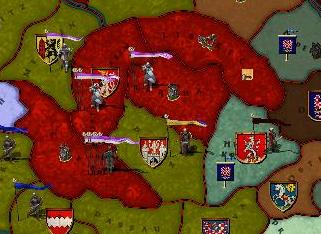
King Otto does little to combat the growing Cathar influences in the realm, and several german counts openly flirt with heresy, taking Cathar preachers under their wing or keeping Cathar writings in their castle libraries. Isaakios refuses to accept any such blasphemy in Swabia, and in 1211 the Countess of Niederbayern declares independence, citing religious oppression.
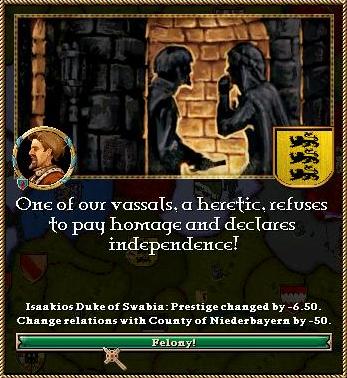
Isaakios' response is swift and brutal.

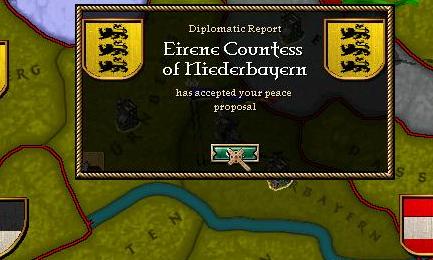
As the Swabian army occupies Niederbayern, Isaakios' trusted but cruel and callous marshal takes certain liberties with a young woman who turns out to be the daughter of a powerful merchant in Wurttemberg. Calls are made for the marshal's execution from representatives of the two lower societal stands. Isaakios fails to understand the outrage, but decides to fine his marshal to calm their emotions.

The Grand Duchal Palace of Swabia stands ready in Wurttemberg in January of 1212. Modelled after the great palaces of Milan, Genua and Venice, it is a strong symbol of the wealth and power of the Hohenzollerns.
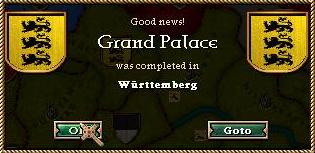
A few quiet years follow, and in February of 1214, King Otto passes away after a short period of illness. He leaves behind a throughoutly unremarkable legacy. The electors convence, and Duke Isaakios is elected King of Germany.
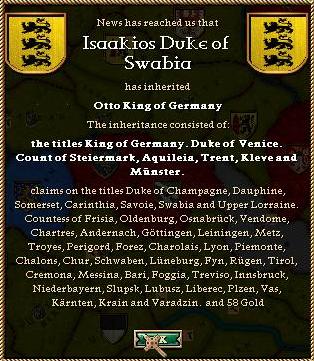
Immediately upon his ascension, the Orthodox King of Lithaunia offers Isaakios a military alliance. A new ruler has seized the Bohemian throne following the turmoil there and is coddling up to Burgundy once more. The prospect of an ally in the east to offset the risk of Bohemian intervention in a future war with Burgundy is too good to pass up.
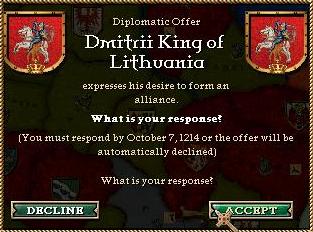
The Cathar counts in Germany, who were largely left alone during Otto's rule, immediately feel the pressure as Isaakios issues several royal edicts banning the possession of Cathar writings and making preaching of the Cathar faith punishable by death. The result is several risings in Tyrol and Friesland.
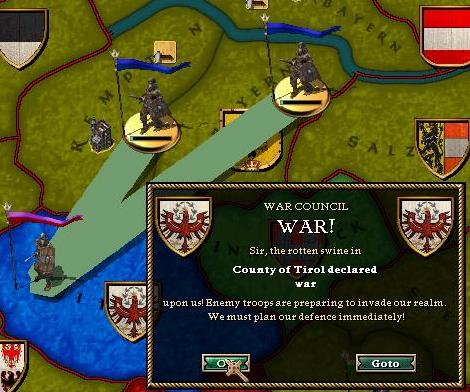
Later in the same year, Isaakios learns that his unwed daughter Anna, who has just reached majority ago and is serving as Swabia's Chancellor, has found herself a lover in one of Isaakios' vassals - and not just any vassal: Count Bartholomaios of Schwaben, Isaakios' brother and Anna's uncle.
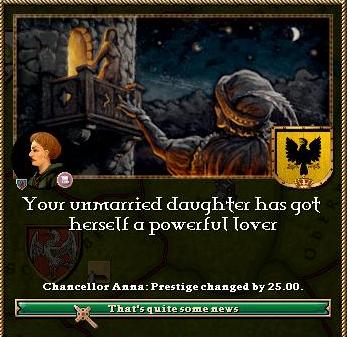
Appalled, Isaakios quickly marries her off to his diocese bishop, hoping that a man of the church can lead her away from such blood sin.
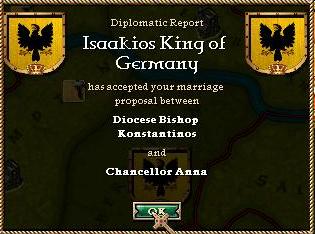
Isaakios' eldest son Konstatinos has also reached majority. A prodigy and brilliant strategist, he shares an arbitrary and cruel streak with his father.
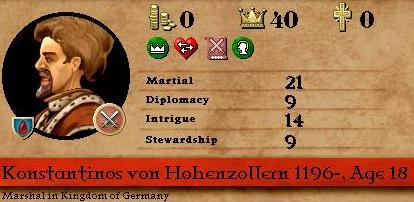
His wife is a talented and pious woman from Fyn, who stands in a good position to become Chancellor or Steward of Germany in the future.
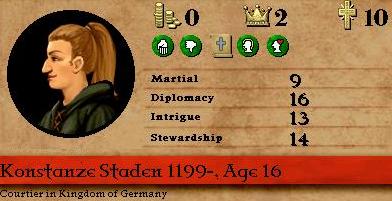
November of 1215 is a black month for the dynasty. The Hohenzollern madness, kept at bay for so long, strikes twice in the same month, taking both the Hohenzollern heir and the King Isaakios' youngest brother Bardas. Though Konstatinos flies into black rages and has his underlings whipped bloody for the slighest mistake, Isaakios refuses to admit that there is anything wrong with his eldest son, and Konstatinos continues to be marshal - and heir.
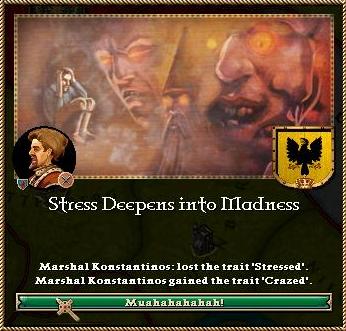
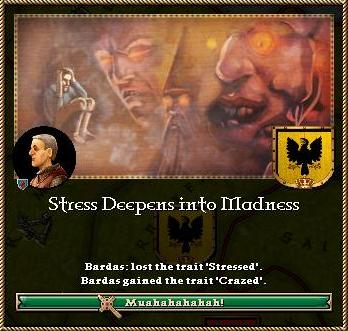
As 1216 nears its end, the heresy that King Otto allowed to take root has been cleansed, the tentative alliance between Bohemia and Burgundy has been severed with yet another new ruler on the Bohemian throne, and Germany's armies outnumber Burgundy's by more than a quarter.
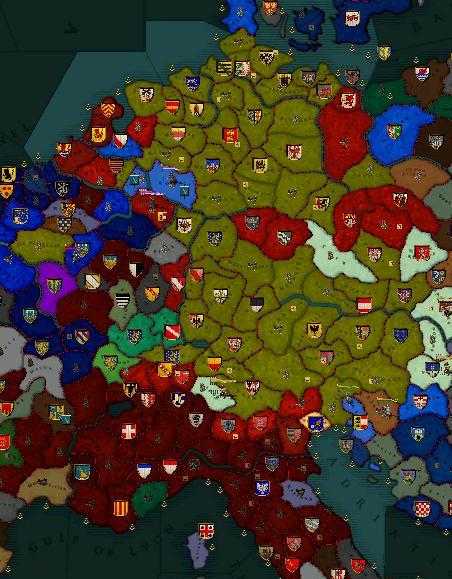
Isaakios gathers his vassals and proudly exclaims that the time has come to teach the Cathar dogs a lesson.
The time has come for war.
